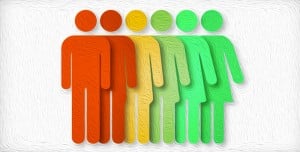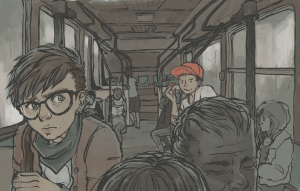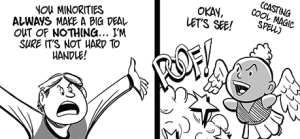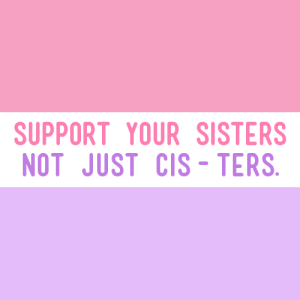
Group of people on their phones leaning against an orange wall.
As activists, we often feel like we need to be “on” at all times.
We have to be informed about any injustice that’s going on so we can help fight it. We need to be a part of the action. We feel called to be doing something that will have positive effects.
Because we live in an Internet age, that can come with a feeling of responsibility: that we should never back away from social media. That we need to always be online. FOMO—or “fear of missing out”—is ever-present.
But research suggests that, as humans, we aren’t prepared for what often amounts to an onslaught of 24/7 global news aided by the Internet age. This connectedness leaves us feeling exhausted and, for activists, can lead to quicker burnout.
When I first heard the news about Kevin Spacey coming out after being accused of sexual violence last week as I was doing my daily email and social media check for work, I panicked.
A lot of my activism is centered on LGBTQIA+ rights and rape culture, and this conversation is right at the intersection of the two. There was plenty of activism work I could do, but I also knew that I had a lot of work to do because it’s Monday and I’ve got several ongoing projects at hand.
There’s already plenty on my plate, and I really only had time to read about the situation and amplify a few voices online.
We need to remember that we’re absolutely allowed to unplug from the Internet and take a step (or five) back from social media—and not just during times when we’re already feeling fatigue and burnout creep in, but on a regular basis to maintain our mental and physical health.
Getting away from social media is actually an important and necessary part of self-care. Here are some reasons why, as activists, we do need to unplug from the Internet and tips on how we can (realistically) do that:
1. We can’t do the work if we’re exhausted or overwhelmed
Between Facebook’s push for users to get more of their news on the platform and people’s tendency to share things that make them outraged, consuming the news is a big part of the online experience in today’s society.
Many people I’m connected with on social media are also invested in similar causes—disability rights, anti-racism, universal health care, environmental protection.
It’s fairly common for me to be using social media as a leisure tool and come across upsetting news, petitions, protests, and long articles or videos on important topics like sub-minimum wages for disabled workers or the effects of climate change on the bee population.
It’s easy to feel burnt out after just a few minutes online. So much on social media has a call-to-action attached, and it’s not possible for us to do anything effectively if we’re putting too much pressure on ourselves to do everything.
To avoid this, we need to prioritize self-care. It’s easy to feel guilty for spending even an hour—never mind an entire weekend, week, or longer—away from social media and from activism work, because there will always be more we can do.
But we need to remember that taking time to recharge regularly helps us come back to activism with fresh enthusiasm, ideas, and the mental capacity to handle challenges.
I try to take social media breaks for several hours daily, although I do usually check in at least once a day on the current news cycle to keep informed.
There are times I dedicate to self-care and recharging, often an entire weekend or longer, where I commit to not checking social media or reading the news (or my email!).
I usually find that I come back to the cause feeling even more ready to do the work that needs to be done, whether it’s organizing, educating, or attending an in-person protest or rally.
2. We can’t fight every single battle all the time
My family and friend circles are full of activists who tackle a variety of issues, from local politics and environmental activism to anti-racism and domestic violence. Because I’m so involved in the activist community, I know people who are involved in what seems like almost every issue.
I’m often surrounded by other activists and reading about what they’re working on, and I think about the things I’ll never have time to be a part of. I often find myself overwhelmed by the sheer amount of what I can’t accomplish as a single individual.
We need to remember to be realistic in what we can accomplish, and this is a huge part of learning to unplug.
I’m not advocating for being completely naïve and uninterested in causes that don’t personally affect us. What I am suggesting is that we try to stick to a few different niches and remember that there are folks doing the work that we can’t.
They may even be better prepared through lived experience and education than we are. Instead of feeling fatigued that we aren’t able to fight for every cause we believe in, we can amplify the work that people are doing and focus on our own strengths.
Most of my activism work revolves around disability and LGBTQIA+ rights, which are both communities that I’m a part of. I also do a lot of work on diversity in publishing and media, so I’m constantly paying attention to conversations about the #WeNeedDiverseBooks movement and the fight to diversify publishing staff.
There are, however, many causes that I believe in but know I don’t have the time, energy, or resources to fight for, so I spend my time amplifying people and organizations that are leading the way.
In my day job as a writer, editor, and social media manager, I am often in a position to shed light on issues and potential solutions, distributing information about activist causes to key influencers who I know will help get the word out.
Even if you don’t have access to these outlets, you can amplify other activists and causes on your own social media channels and by word-of-mouth locally.
3. Activists are frequent targets for online harassment
Particularly if you are marginalized or multiply marginalized and in any type of visible position, being an activist also comes with targeting online. If you’re speaking up for a cause, chances are high that there will be trolls and other folks online who disagree.
‘Disagreement’ may mean a comment here or there, but it can also escalate into things like being harassed, doxxed, and threatened.
If this happens, make sure to practice immediate self-care in the moment, but also use it as a reason to regularly recharge and step back from the Internet and social media. Build these breaks into your routine.
Depending on how often you engage online, you might take a 15-minute break for every hour spent online or take 2 full days per week to go off the grid. Check in with your own mental and physical health, and your energy levels, to see if these breaks are working for you.
I started taking planned social media breaks about two years ago. I was already working at least part-time in a social media capacity for organizations, as well as using the web as a resource for my freelance and volunteer work, which is frequently activism-based.
At the time, I was exhausted and had no idea how to navigate this. After my “official” work hours ended, was I expected to be online at all times in case I came across a political story I could pitch it to an editor?
Should I be there retweeting hashtags as soon as they started, before they were even viral? If I didn’t know about the latest news in disability rights and health care, how could I put together an action plan?
Planning daily and weekly breaks into my work week became absolutely critical to remaining healthy and engaged.
You might also want to consider checking in with your community to see if there’s a way other people can support you so that you’re able to take breaks when you need to.
If you’re managing social media for a nonprofit or organization—or as a public figure yourself—you might see if there are other moderators who can step in at least a few times a week so you’re not the only one doing the work.
Asking for help can be difficult, but support from your community can be really beneficial when you’re trying to recharge, particularly if you’ve been subject to harassment.
****
When activism is a big part of your work (and possibly even your identity), it can be hard to separate yourself. You might feel like you need to be engaged at all times.
For example, I often feel the pressure if I see a call for pitches from an online magazine looking to publish a themed issue on consent and I don’t send in options related to the causes I care about, such as campus sexual violence, inclusive sex and consent education, or rape culture.
I need to remember that I won’t do effective, good work if I’m constantly exhausted because I’m pushing myself to be involved 24/7 in so many things. Like anyone else, I need time off and breaks from the constant flow of work, whether it’s paid or volunteer.
I need to prioritize self-care. I need to know when to step back (which can be tough, especially if you are being harassed or threatened) and when to ask for help.
I recommend resources like The Self Care Project, Rest for Resistance, Everyday Feminism, Wear Your Voice Magazine, The Establishment, and these self-care options for days when the world feels terrible.
These are lessons we all need to take seriously, especially as the Internet and social media become more advanced.
We may have constant access to a vast amount of information, but we can’t do anything about it if we aren’t strategic—especially in how we build self-care into our priority lists for daily life.
[do_widget id=’text-101′]
Alaina Leary is an Everyday Feminism Reporting Fellow. She is a Bostonian currently studying for her MA in publishing at Emerson College. She’s a disabled, queer activist and is on the social media team at We Need Diverse Books. She can often be found re-reading her favorite books and covering everything in glitter. You can find her at her website or on Instagram and Twitter @alainaskeys. Read her articles here.
Search our 3000+ articles!
Read our articles about:
Our online racial justice training
Used by hundreds of universities, non-profits, and businesses.
Click to learn more




















